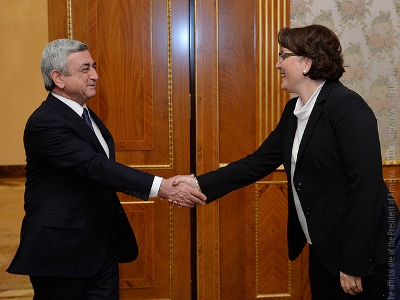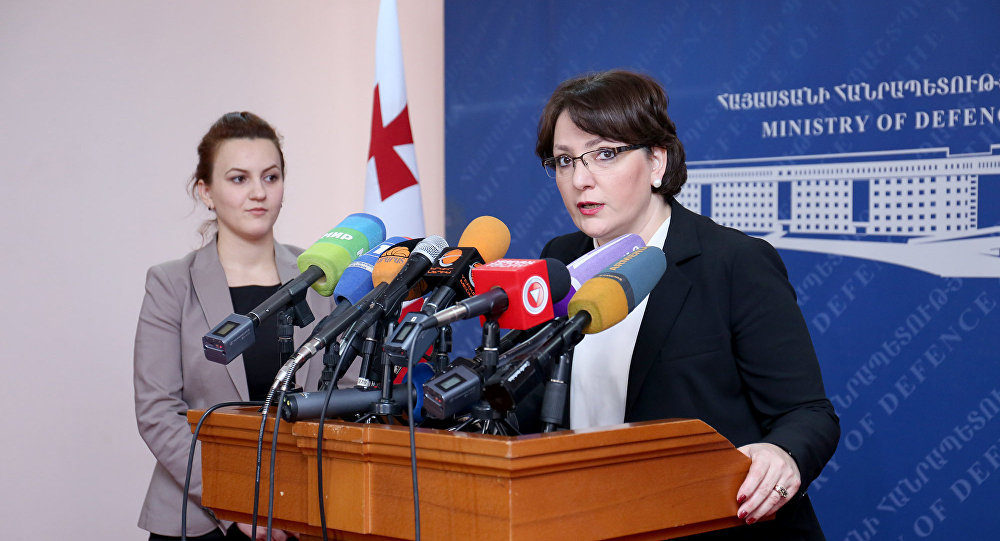Georgian Defense Minister Tina Khidasheli visited Yerevan at the invitation of her Armenian counterpart. The defense ministers of the two countries have already met before, but this visit was particularly interesting. Khidasheli is believed to be one of the most radical pro-Western politicians in Georgia. She appeared in the government at the initiative of the Republican Party, which advocates a steady continuation of the Euro-Atlantic course, being a part of the ruling 'Georgian Dream' coalition. Khidasheli enjoys a certain 'autonomy' in the government of Giorgi Kvirikashvili, as well as her party in the ruling coalition, but she will never take steps contradicting the general course. If we analyze the results of the negotiations with her Armenian colleagues, it is clear that they have no evidence of shifts in Georgia's foreign policy and military doctrine.
In 1995 the Republican Party, through its intellectual leader, Ivlian Khaindrava, developed and published the concept of a strategic alliance between Georgia, Azerbaijan and Turkey, including long-term cooperation in the field of transportation of energy resources to the West. In this sense, the Minister of Defense is one of the most influential figures in the current Cabinet.
Tina Khidasheli was received in Yerevan at the highest level – she met with the President, Prime Minister, Foreign Minister and Catholicos of All Armenians.

A curious document was signed following the talks with the Defense Minister Seyran Ohanyan – a program of military cooperation between Armenia and Georgia in 2016, implementing "the exchange of experience in the field of peacekeeping, military education, training and strategic planning." There is not even a hint at the Armenian-Azerbaijani conflict in the text, however, the Armenian Defense Minister, creatively developing the diplomatic wording of the agreement, said that Georgia and Armenia "cooperate on issues of international security in the region, in the context of which the Armenian side attaches great importance to dialogue, solving the problems through political dialogue and an atmosphere of tolerance." Translated from diplomatic language to normal speech, the meaning of the phrase is maintaining the status quo.
However, Tina Khidasheli has placed several other accents at the press conference after talks with her Armenian counterpart. "We attach great importance to the discussion of issues that unite Armenia and Georgia," the minister said, hinting that there are other regional problems where the positions of Yerevan and Tbilisi differ. Moreover, Tina Khidasheli said bluntly that Turkey and Azerbaijan are Georgia's strategic partners. "Turkey is our neighboring country that is a NATO member, and this further intensifies the relations between our countries. Georgia is grateful to everyone supporting and assisting it. Turkey offers assistance at the political level at the ministerial and high-level meetings," the press service of the Ministry of Defense cited Khidasheli as saying.

In Yerevan, the head of the Georgian Defense Ministry noted the importance of strategic partnership with Ankara and Baku for Tbilisi
At the same time, Tbilisi stresses that there is nothing new in the Georgian-Armenian document, and the basic provisions of the program were negotiated and are being implemented since 2010. Tina Khidasheli drew special attention to the participation of the Armenian contingent in the NATO-led operation in Afghanistan, where about 700 Georgian servicemen serve. "The fact that Armenian and Georgian peacekeepers are working together for the sake of global stability and peace in Afghanistan is a good example," Khidasheli said, making it clear that for Georgia, seeking to join NATO, such participation is quite natural, Armenia thus continues a policy of complementarity in relation to the two centers of power – Russia and NATO.
The first who touched on this delicate issue in his speech was the Armenian Defense Minister. According to him, "despite the fact that Armenia is a CSTO member and Georgia seeks to join NATO, it does not interfere with the interaction of the two neighboring countries." The key moment in this phrase is the fact that Armenia is already included in a powerful military-political bloc and Georgia just intends to join NATO with rather vague prospects of achieving the goal. (It is worth mentioning that Khidasheli had repeatedly warned her Western colleagues that if Tbilisi doesn't receive a roadmap for joining the Alliance in the near future, pro-Russian forces could win in the parliamentary elections in 2016).
Apparently, the main outcome of the talks in Yerevan was the parties' agreement on the need to respect the level of military cooperation between Georgia and Armenia, which has been practiced since the time of Shevardnadze's presidency, that is, for the past 20 years, and which called for the neutrality of Georgia with regard to the Armenian-Azerbaijani conflict.
The preparation of both Armenian and Azerbaijani 'mountain shooters' at the military training base in Sachkhere, repair of armored vehicles of the warring countries at the Tbilisi military factory, as well as 'open transit' of the forces and resources from Russia and Turkey were manifestations of this long-term policy in different periods. It's unlikely that the visit of Tina Khidasheli will fundamentally change anything in this respect, despite the loud statements and verbose programs.






